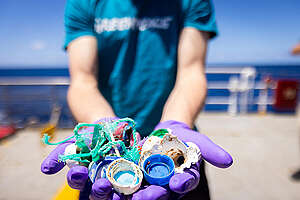The dirty secret behind Australia’s most trusted carmaker.
When Toyota introduced the Prius hybrid in 1997, the company truly was a leader in reducing car pollution. But that was more than two decades ago. Toyota’s transition to cleaner vehicles has stalled and the company is now one of the world’s biggest roadblocks to electric vehicles.
Toyota has been fighting against effective climate policy all over the world, including in Australia: blocking clean air regulation, flip-flopping on renewables and pressuring governments to support fossil fuel powered hybrid cars.
We can’t sit aside while Toyota continues to put profit ahead of the health and safety of Australians and our precious environment.
It’s time to stand up to this big polluter and expose Toyota’s dirty backroom lobbying. Together we can put the brakes on Toyota’s dirty dealings and pressure the company to switch to cleaner, healthier electric vehicles. Toyota was once a world leader – and it can be again, if it cleans up its act.
Why is Toyota fighting against cleaner cars?
Toyota is looking to delay the transition to cleaner cars for as long as possible while it continues to turn a profit from the sale of fossil fuel engines. Internal combustion and hybrid engines are complicated pieces of machinery, requiring lots of parts and ongoing maintenance, all of which Toyota can generate returns on. While many of Toyota’s rivals are speeding ahead in the shift to electric vehicles, Toyota has opted to delay rather than embrace the shift.
Toyota’s Track Record
Twenty-five years ago when the Prius was invented, hybrid technology was at the cutting edge of the transition to electric vehicles, but technology has moved on, with battery electric technologies quickly becoming the common-sense solution. Toyota has stalled on pure electric cars, opting to promote hybrid and fuel cell technologies that will lock customers into paying for fossil fuels or hydrogen for decades to come.
Since doubling down on fossil fuel hybrids and hydrogen cars, Toyota has resorted to disinformation campaigns instead of investing in battery electric cars. For example, Toyota is reported to have distributed leaflets in Japan criticising EVs and decarbonisation policy;2 and in Australia has asserted hybrids will reduce more emissions sooner than battery electric vehicles.
Toyota has a clear track record of fighting against government policies designed to reduce transport sector emissions, improve air quality and human health, and make electric vehicles more affordable. Scroll down for examples from around the world.
Toyota’s marketing spin reads like a 1950s tobacco campaign except instead of ‘toasted’ tobacco, we get ‘self charging’ vehicles masking fossil fuel powered engines. Charging an electric vehicle is no different to plugging your phone in overnight, but Toyota’s attempts to sow doubt over electric vehicles play to established myths, misinforming well-meaning consumers about electric vehicles.

